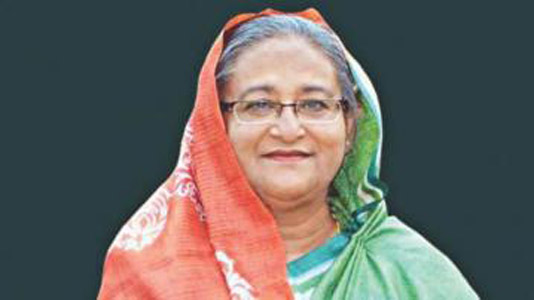DHAKA, 17, 2017 (BSS) – Prime Minister Sheikh Hasina yesterday said despite Bangladesh’s victory on Dec 16, 1971, she was in Pakistani captivity in Dhaka along with family members for one more day.
“There were jubilant slogans – Joy Bangla — all over, but we were still in captivity in a house at Dhanmandi’s Road No 18,” she said addressing a cultural rally on Victory Day at Suhrawardy Udyan through video conferencing from her Ganobhaban residence.
Sheikh Hasina recalled “it took one more day for us to be freed” with Pakistani soldiers outside guarding the house.
Pakistani soldiers, she said, kept confined the rest of the family including her mother Begum Fazilatunnesa Mujib, sister Sheikh Rehana and brother Sheikh Russell.
Bangabandhu was in captivity in Pakistan while two of her brothers Sheikh Kamal and Sheikh Jamal, who managed to flee the captivity in that house, were on war at the front on that day.
Records and witnesses suggest that Sheikh Hasina and other members of Bangabandhu family were exposed to high risks of being massacred by frightened enemy guards, as last casualties of 1971.
“The Pakistani soldiers guarding the house were looked frightened but arrogant . . . visibly they were unaware of the surrender even on that morning of December 17,” one of the Bangabandhu’s aides, Hazi Golam Morshed, told BSS in an interview.
Morshed, now 87, said he had escorted the squad of Indian soldiers led by gallantry award winning Major Ashok Tara to the house at road number 18 of Dhanmondi.
“Major Tara approached the (Pakistani) soldiers in bare hands keeping his weapon to his men behind . . . One of the guards shouted, asking him not to proceed a single step further,” he recalled.
Morshed described the subsequent few minutes to be highly delicate as it appeared that the “frustrated, frightened and directionless” Pakistani guards could do anything at that time.
In separate media interviews, Tara supplemented him saying “it was a very sensitive and important operation, and had anything gone wrong, it would have brought a very bad name to the Indian government and the Indian Army”.
Records suggest that on the previous night, the Pakistani soldiers, unaware of the surrender of their higher command killed five people including a woman as they were passing by the house.
Tara, whom Bangladesh later conferred the “Friend of Bangladesh” award, recalled he came out of the car and handed his sten gun over to the JCO and asked his three men of his squad to stay on one side of the road and began a slow walk to the house.
A Pakistan sentry on the rooftop warned him that he would be shot if he took another step further being visibly confused seeing the Indian army appearance at the scene.
“See, I am an Indian army officer standing unarmed in front of you . . . If I have reached unarmed in front of you, it means your army has surrendered, you can ask your officer,” Tara recalled shouting back in a mix of Punjabi and Hindi.
After few moments, the Pakistani havildar shouted back saying “I have no contact with the officer”.
The Indian major recalled that he later came to know that a Pakistani captain had abandoned his post and the news of the surrender had not yet reached the lower ranks as communications were disrupted.
Incidentally at that time, he said, few Indian helicopters flew overhead and “I pointed to them and shouted — look our helicopters are flying in the sky and look behind me, our jawans are inside Dhaka”.
Tara again started walking slowly towards the house telling the guards “you have a family with children as I do; if you lay down your arms and come out peacefully, I guarantee you a safe passage to your camp or wherever you want to go to”.
But as he reached the entrance a young Pakistani soldier aged only about 18 appeared from the bunker at the gates pointed his rifle at him.
“The young boy was shivering. It was probably the first time he saw an Indian army officer at such close quarters . . . I locked eyes with the boy even as I was talking to the havildar on the rooftop . . . I kept up the conversation and softly pushed the barrel of the gun away from my body,” he said.
Tara, a Bengali who retired as a highly decorated colonel of Indian army later said the conversation lasted for about 10 minutes when he spoke to the captors in fluent Hindi and Punjabi and the tense situation was finally dispelled without any casualties.
“And as soon as I entered the house, (Bangabandhu) Sheikh Mujibur Rahman’s wife hugged me and said I was her son sent by God from the heaven (to save the family),” he recalled.



